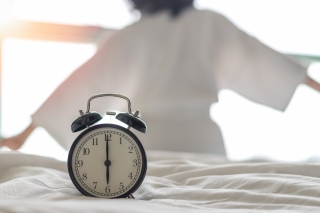5 Million Euros for Research into Lifestyle Influences on Disruption Biological Clock
International public-private cooperation supports research into how behaviour influences the recovery of the 24-hour rhythm of people with diabetes type 2
This year, researchers at Dutch and Canadian universities will start research into how lifestyle contributes to the recovery of the 24-hour metabolic rhythm in people with a high risk of diabetes type 2. More than 1 million people in the Netherlands have diabetes type 2, and it is estimated that there are just as many people with prediabetes. The findings will form the basis for effective lifestyle interventions that can contribute to the prevention of diabetes type 2. The research has been made possible through a collaboration between Dutch and Canadian organisations: the Dutch Diabetes Research Foundation, the Netherlands Organisation for Health Research and Development (ZonMw), Health~Holland and the Canadian Institutes of Health Research (CIHR).
When the clocks are put forward next weekend, this will lead to sleep problems and a disrupted biorhythm, which some people may suffer from for weeks*. A disrupted biological clock can result in health problems. Because we live in a 24-hour economy, a disruption of the biological clock can occur due to artificial lighting and digital screens, working in shifts, travelling across time zones, sleeping at differing times, and access to food and drink during all hours of the day and at night. Dutch researchers previously found that people with an increased risk for diabetes type 2 have a disrupted day-night rhythm of the metabolism**.
Marcel Joachimsthal, Chair of the Advisory Board Top Sector LSH: 'Together we will realize our mission that by 2040, the burden of disease resulting from an unhealthy lifestyle and living environment will have decreased by 30%.'
Prof. Patrick Schrauwen, professor at Maastricht University and principal investigator: ‘We want to investigate whether adapting behaviour has a favourable effect on restoring the day-night rhythm of the metabolism. There are clear indications that the right timing of certain behaviour can have a favourable effect on health. For example, different effects can be attributed to taking exercise in the morning, afternoon or in the evening. When (and also how much and what) we eat during the day makes a difference too. Our research documents the time-related lifestyle interventions that influence the metabolism of people with a high risk of diabetes type 2. Based on these results, we will develop effective lifestyle interventions to reduce the risk of diabetes type 2 among this group of people.’
International cooperation
This cooperation brings together a number of the world’s top experts in the field of diabetes research. In this study, Prof. Patrick Schrauwen will work, amongst others, with his Canadian colleague Prof. André Carpentier. The study, entitled “The right timing to prevent type 2 Diabetes” (TIMED), requires a total budget of 5 million euros. The Netherlands Organisation for Health Research and Development (ZonMw), Top Sector Life Sciences & Health (Health~Holland), the Canadian Institutes of Health Research (CIHR), and the Dutch Diabetes Research Foundation will provide a joint contribution of 4 million euros. Private partners jointly contribute 1 Million euros. Erik Werson, member of the public advisory council of the Dutch Diabetes Research Foundation: ‘More than half of the cases of diabetes type 2 can be prevented by adopting a healthier lifestyle. The results from this research and the lifestyle interventions to be developed will help to make it easier to adopt a healthy lifestyle so that a life with diabetes type 2 can be prevented.’

